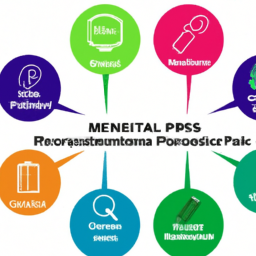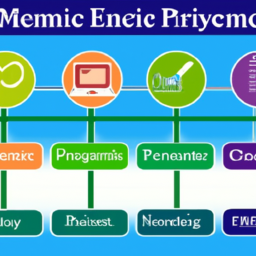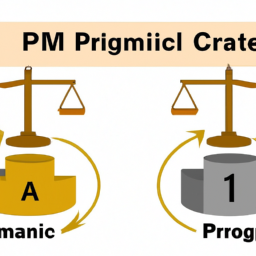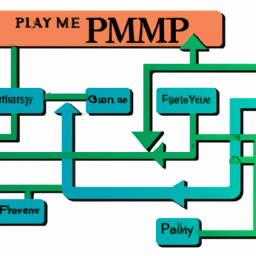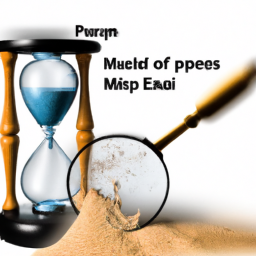Are you tired of feeling stuck in your career? Ready to take your professional growth to the next level? Look no further than the PMP exam – your ultimate ticket to career advancement and higher salaries.
This certification can open doors you never thought possible, propelling you towards success like never before. In this article, we’ll explore the importance of the PMP exam, how it can boost your salary, and the key benefits of passing.
Get ready to prepare for the exam and excel in your career like never before!
Key Takeaways
- PMP certification demonstrates expertise and knowledge in project management
- PMP-certified professionals earn higher salaries on average
- PMP certification opens doors to new opportunities and enhances credibility in the industry
- PMP certification can lead to leadership positions and career advancement
The Importance of the PMP Exam for Career Advancement
If you want to advance your career and earn higher salaries, passing the PMP exam is crucial.
The PMP exam offers numerous advantages that can significantly impact your professional journey.
Firstly, obtaining a PMP certification demonstrates your expertise and knowledge in project management, making you a valuable asset to any organization. It validates your skills in initiating, planning, executing, monitoring, and closing projects, allowing you to take on more challenging and rewarding roles.
Secondly, PMP certification opens doors to new opportunities and enhances your credibility in the industry. Many employers prioritize hiring PMP-certified professionals, as they are confident in their ability to deliver successful projects.
Lastly, PMP certification increases your earning potential. According to the Project Management Salary Survey, PMP-certified professionals earn higher salaries on average than their non-certified counterparts.
How the PMP Certification Can Boost Your Salary
Maximize your earning potential by obtaining PMP certification.
As a project management professional, you have the opportunity to negotiate higher salaries due to the market demand for individuals with this certification. The PMP certification is highly recognized and respected in the industry, making you a valuable asset to any organization.
With this certification, you can showcase your expertise in project management and demonstrate your ability to successfully lead and execute projects. Employers understand the value of PMP certification and are willing to compensate individuals accordingly.
By obtaining this certification, you position yourself for salary negotiations that can significantly increase your earning potential. The demand for project managers with PMP certification is on the rise, and by investing in your professional development, you can secure higher salaries and unlock new career opportunities.
Now, let’s explore the key benefits of passing the PMP exam.
Key Benefits of Passing the PMP Exam
By passing the PMP exam, you’ll open doors to new opportunities and expand your professional network. Here are the key benefits of achieving this milestone:
-
Increased Job Opportunities: The PMP certification is globally recognized and highly sought after by employers across industries. With this credential, you’ll be eligible for a wide range of project management roles, both domestically and internationally. Companies value the skills and knowledge that come with PMP certification, making you a top candidate for their project management teams.
-
Professional Recognition: The PMP certification is a mark of excellence and demonstrates your commitment to the project management profession. It showcases your expertise in leading projects and managing teams, giving you professional recognition among your peers and colleagues. This recognition can open doors to leadership positions and career advancement opportunities.
-
Expanded Professional Network: Through the PMP certification, you’ll become part of a global community of project management professionals. You’ll have the opportunity to connect with like-minded individuals, share best practices, and gain insights from industry experts. This expanded network can provide valuable resources, mentorship, and potential collaborations to further enhance your career.
Passing the PMP exam is just the first step towards excelling in your career. Now, let’s dive into the steps to prepare for the PMP exam and excel in your project management journey.
Steps to Prepare for the PMP Exam and Excel in Your Career
Let’s start with the first step in preparing for the PMP exam: understanding the exam requirements and eligibility criteria. To ensure a successful PMP exam preparation journey, it is crucial to familiarize yourself with the prerequisites.
The Project Management Institute (PMI) requires a combination of education and professional experience in project management. Once you meet the eligibility criteria, it is time to dive into the PMP exam preparation tips.
Firstly, create a study plan that outlines your goals, timelines, and study materials.
Secondly, utilize practice exams to assess your knowledge and identify areas that need improvement.
Thirdly, explore various resources such as books, online courses, and study groups to enhance your understanding of project management concepts.
Real-life Success Stories of PMP Certified Professionals
Gain inspiration and motivation from the real-life success stories of professionals who have achieved PMP certification, showing you the possibilities and potential that lie ahead.
Here are three examples of how PMP certification has opened doors for individuals and helped them overcome challenges:
-
Unexpected Opportunities: After earning their PMP certification, many professionals have been presented with unexpected career opportunities. They have been able to work on high-profile projects, lead cross-functional teams, and take on more challenging roles within their organizations.
-
Overcoming Challenges: PMP certification is not an easy feat, but those who have achieved it have proven their ability to overcome challenges. From juggling work and study commitments to mastering complex project management concepts, these individuals have demonstrated their determination and resilience.
-
Career Advancement: PMP certification has been a stepping stone for professionals looking to advance their careers. Many have seen significant salary increases, promotions to managerial positions, and greater recognition for their expertise in project management.
These success stories highlight the real-world benefits of PMP certification, inspiring you to pursue your own path to success.
Frequently Asked Questions
What Are the Eligibility Requirements to Take the PMP Exam?
To take the PMP exam, you must meet certain eligibility requirements. These requirements include:
- A minimum of a high school diploma or global equivalent.
- 35 hours of project management education.
- A minimum of 4,500 hours of project management experience if you have a bachelor’s degree or 7,500 hours if you have a high school diploma or global equivalent.
Additionally, you must also:
- Pass a formal application process.
- Pay the exam fee.
How Much Does It Cost to Take the PMP Exam?
Taking the PMP exam can be quite the investment. The PMP exam fees can range from $405 to $555, depending on whether you are a member of the Project Management Institute (PMI).
But don’t let the cost deter you. With careful PMP exam budgeting and preparation, the benefits of earning your PMP certification far outweigh the initial expenses.
It can open doors to career growth and higher salaries, making it a worthwhile investment in your professional development.
Is the PMP Exam Difficult? What Is the Pass Rate?
The PMP exam can be challenging, but with proper preparation and study, you can pass.
The pass rate for the PMP exam varies, but it is generally around 60-70%.
It’s important to understand the exam structure and content, as well as practice with sample questions and mock exams.
Are There Any Prerequisites or Recommended Experience for Taking the PMP Exam?
To pass the PMP exam, you need to meet certain prerequisites and have recommended experience.
To ensure success, it’s recommended that you have a minimum of three years of project management experience and at least 35 hours of preparatory courses.
These requirements are in place to ensure that candidates have the necessary knowledge and skills to effectively manage projects.
How Long Does It Take to Prepare for the PMP Exam?
To properly prepare for the PMP exam, you need to consider the amount of time it will take. The PMP exam requires a dedicated study timeline, as it covers a wide range of topics.
It is recommended to spend several months studying and reviewing the PMP exam study resources. By allocating enough time for studying and understanding the concepts, you will increase your chances of passing the PMP exam and advancing your career.
Conclusion
In conclusion, the PMP exam is your golden ticket to unlocking career growth and higher salaries. By obtaining this certification, you position yourself as a valuable asset in the eyes of employers, leading to increased job opportunities and upward mobility.
The PMP certification not only validates your project management skills but also showcases your dedication and commitment to professional development. So, don’t wait any longer. Start preparing for the PMP exam today and witness the transformative power it holds for your career.


